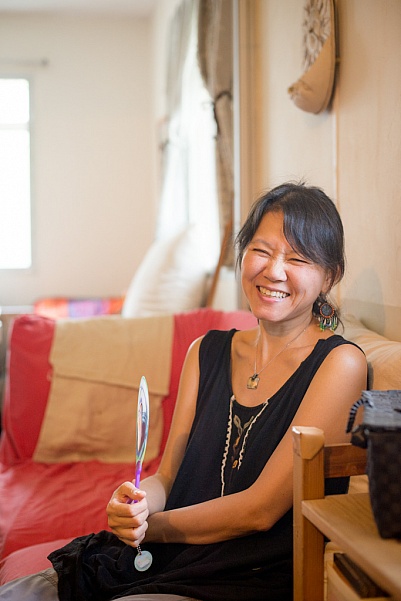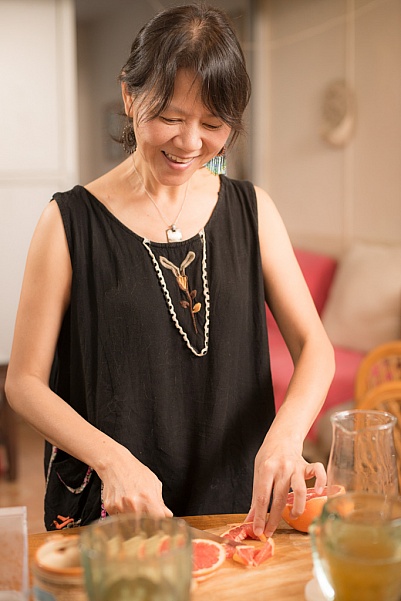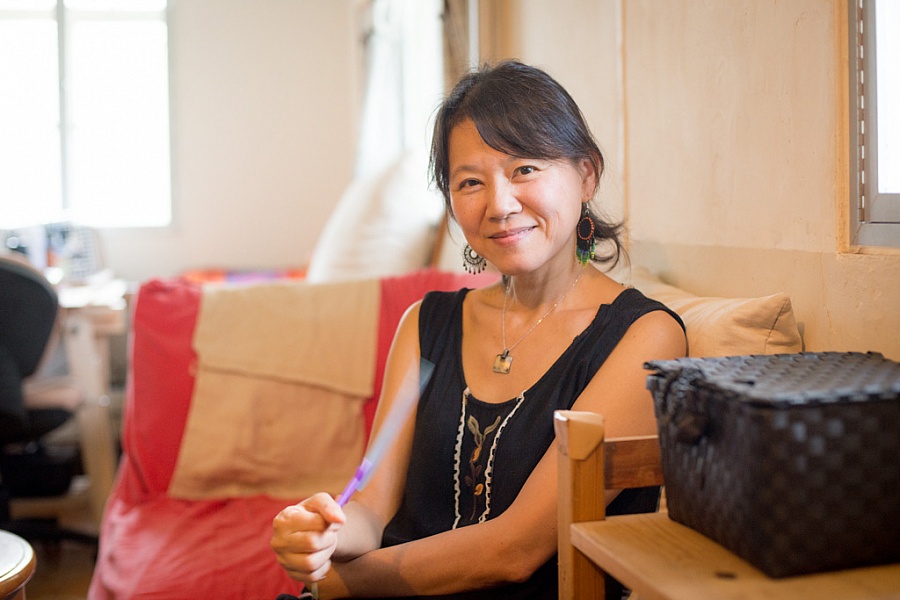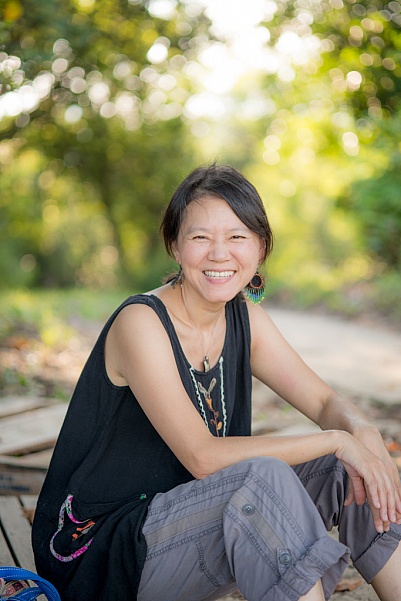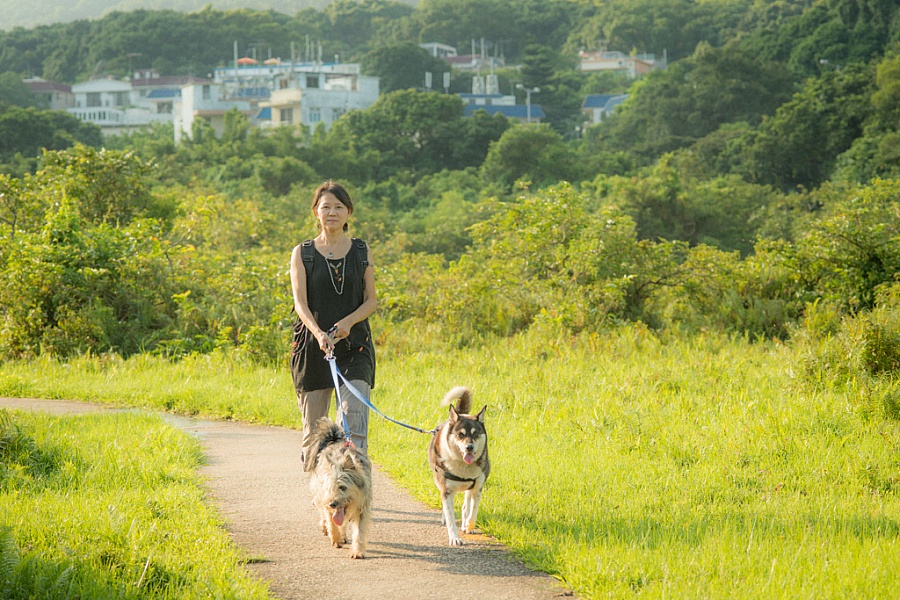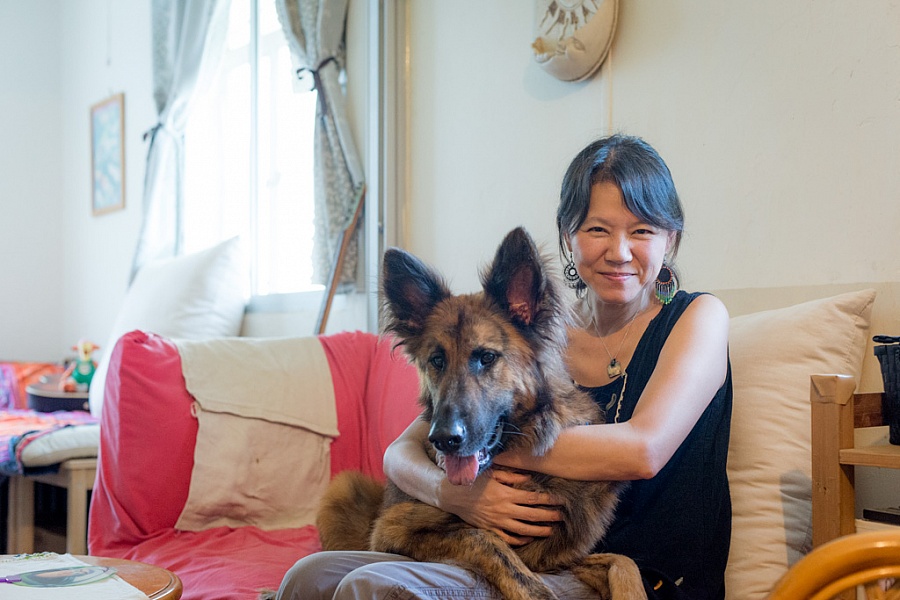Dear Diary,
A green lifestyle should not only be about using environmentally-friendly products or using fewer plastic bags. At the same time, it should be more than having rooftop farms or consuming local, organic farm products that try to keep a low carbon footprint. Living a simple life, consuming less, and proactively engaging with this world, both with people, animals and with the environment, should be the essence of a sustainable lifestyle. Our friend Eunice Chu Yat-sum is a model practitioner of this lifestyle.
Eunice is an ‘animals’ person. It seems as if she can communicate with animals in their own language. This gift of hers began when she was a child living on the rooftop of a ‘tong lau’ (an old walk-up building) in the city. Whenever Eunice and her parents saw animals wandering on the street, they would give them shelter back at their rooftop home. Rabbits, chickens, dogs and even turtles – they all became her great friends. In the wintertime, she would go to sleep hugging a chicken. During these months when the streets were cold at night, their rooftop space would provide the animals somewhere warm to stay. This special space nurtured Eunice’s love of animals and her spirit of living with animals in harmony.
Eunice now lives on Lantau, where she spends a fair amount of time looking after stray cows on the island. “Stray cows is a wrong concept,” said Eunice. “You should call them community cows. They are not stray animals but community animals as they have always lived here on the island and in this community. However, as people build more and more houses here, they also started to force the cows out. The beasts used to live on farms here on the island but as they started to close one by one, the cows no longer had anywhere to stay and were therefore pushed to roam the island.”
When we went to see Eunice at her home in Lantau, there were two dogs that she recently took in from the street. When they first saw Chloe and me – two strangers to them – they couldn’t stop barking at us. Eunice said: “If you shout at the dogs or ask them to quiet down when they’re barking at you, it will actually make them even more temperamental. You should talk to them gently and interact with them in a peaceful and quiet way.” Eunice then showed us how it should be done, and the dogs immediately stopped barking. You would not believe that only a few days after Eunice brought the two dogs back to her home, they were already following what she asked of them, which just shows how skillfully communicative she is with animals.
Eunice is an experienced reporter and she once covered the environment beat for the now-defunct Hong Kong Daily News. It was more than 20 years ago when the concept of environmental protection first came up. At that time, people thought that if they were to live a green lifestyle, they would have to do away with things like plastic bags or air-conditioners. Although the environment page in Hong Kong Daily News was later scrapped, Eunice had gained a lot of knowledge about sustainable lifestyles. Together with a bit of ‘domestic wisdom’, she has managed to turn her house on Lantau into a model of sustainable living.
For example, she investigated the air flow directions in her flat and identified where the heat and sunshine came from. Once she found the answers she kept the curtains drawn over a ‘heat-prone’ window so as to minimize the amount of sunshine entering her flat. She also put an electric fan next to that window to help move the warm air out of her flat through another window. The result? Her flat is kept cool and she does not need the air-con. Also, more than 80 percent of her furniture is second hand. Although they are all rejects, so to speak, they all look very nice in her flat and you will not be able to tell they are unwanted by others.
Eunice also likes to turn household castaways into new furniture. For example, the base of her bed is made by putting eight wooden tea tables together, and her desk is made of wood from a big, unwanted TV cabinet. In addition to the bamboo towels that she uses to clean the dishes, she also makes her own detergent from food waste such as orange and lemon peels; chemical detergents have no place in her kitchen.
Apart from making her own household items from recycled materials, she actively tries to lower the carbon footprint of her diet. For example, she seldom consumes meat, and she would only prepare meat as food for her dogs. She also prefers simple dishes with little ingredients, and she makes kefir so that make her own yogurt with no food additives. She would share the kefir with others so they can in turn make their own yogurt, on the condition that these kefir-takers will also keeping sharing kefir for free. She is also very active in an online forum where she advises others how they can make kefir.
Although she has taken many active steps to adopt a green lifestyle, she does not think that somehow sets her apart from others. “Keeping a sustainable lifestyle is not a ritual, and it should not exclude those who may not spend as much effort in adopting a similar lifestyle,” said Eunice. “If it is just not practical or feasible, one shouldn’t insist it just for the sake of keeping it like a ritual.”
What do you like the most about Hong Kong?
I really like Hong Kong as a city because it is close to the water, and there are mountains and nice scenery. The countryside is very accessible in Hong Kong. Instead of being a piece of flat land, the hills make Hong Kong a very interesting city. Although Victoria Harbour is getting narrower, it still has twists and turns whereas Shanghai’s Huangpu River is just wide and straight – that’s just not very interesting. And if you live in the New Territories, you can have a house with a sea view at a very low price.
What do you dislike about Hong Kong?
I dislike property speculators. Urban development forces people to speculate in real estate; it also forces out small stalls. I know someone who sells clothes that are designed and produced by himself, and the Central shop where he runs his business is worth up to $70,000 in rent per month. However he has a very kind landlord who’s letting the shop for $30,000 on a five-year contract. Otherwise he will not be able to survive. Property speculation kills off all the traditional crafts and creativity in the city. It makes everything in the city homogeneous.
What does Hong Kong have to do in order to be sustainable?
There are many things that require initiative to start up, and once they take off people will begin to follow. However many of these things have always been initiated by foreigners. For example Lantau has eight to10 environmental NGOs; they are all led by foreigners. Chinese people tend to care a lot about themselves – their houses and their kids for instance – but they don’t seem to care too much about the environment. The whole society needs to be a lot more active about caring for the environment.
